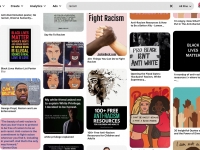Three Senior Women Executives Allege Toxic Workplace at ‘Family-Friendly’ Pinterest

Pinterest, a social media network with an overwhelmingly female user base who share images of hobbies and ‘ideas,’ has a reputation of being a family friendly company. All that changed recently when three top female executives came forward to say they were subjected to major workplace discrimination.
Francoise Brougher, the company’s former Chief Operating Officer, sued the company for gender discrimination in San Francisco last August. Aerica Shimizu Banks and Ifeoma Ozoma, two Black employees, also quit Pinterest earlier in the year, complaining of racist comments, unfair pay and retaliation.
Founded in 2010 in San Francisco, California, Pinterest now boasts 416 million active users who share a "catalogue of ideas" to inspire others to "go out and do that thing". These users “pin” pictures from craft design to cooking recipes to weddings for others to browse and share. Some 71 percent of the global user base are women, including 42 percent of all adult women in the United States, according to Statista.
“Although 70% of Pinterest’s users are women, the company is steered by men with little input from female executives. Pinterest’s female executives, even at the highest levels, are marginalised, excluded and silenced,” Brougher wrote in a blog post titled ‘The Pinterest Paradox: Cupcakes and Toxicity.’ “When men speak out, they get rewarded. When women speak out, they get fired,” she told the New York Times newspaper.
Brougher sued Pinterest after she was fired by CEO Ben Silbermann in April 2020. Her lawsuit alleges that she was let go after she complained about discrimination and misogyny, notably about Todd Morgenfeld, Pinterest Chief Financial Officer, who allegedly made demeaning sexist comments towards her. To add insult to injury, Brougher says Silbermann asked her to make her termination seem voluntary - which she refused to do.
Brougher alleges that she was paid less than her male counterparts for similar work and had to demand equal rights. In her lawsuit she says that she was criticized for “not being compliant or collaborative enough."
The other two women shared similar stories of gender discrimination.
Banks, a former Google staffer who worked on Pinterest’s Social Impact Policy team, got into trouble soon after she drafted a policy to address the fact that hospitality, security and janitorial contract workers, the lowest-paid contract staff at the company, were not receiving holiday pay from the company. Banks also described a team dinner with Charlie Hale, her boss, where he allegedly made offensive comments about her Afro-Japanese heritage as well as about a Jewish colleague.
Senior managers at Pinterest accused Banks of lying and hired a personal investigator to question and investigate her. "It was a torturous experience," Banks said.
Ozoma, who previously worked for both Google and Facebook, says that while she was highly praised and received a raise for her work at Pinterest, she was not promoted. "They wanted to pay me a junior salary and have me do senior work,” she told Business Insider." Then a Pinterest employee leaked her name to a far-right political group which caused her to receive rape and death threats.
Banks and Ozoma have both filed complaints with California’s Department of Fair Employment & Housing. Both alleged that they were doing the same level of work as their manager - a white male - yet were being paid at a lower level. “We found out he was at the highest level even though we were splitting the work equally in two, and then in three when Aerica started,” Ozoma says. “We were leading the most substantive work that most materially benefited the company.” In February 2020, Banks was given permission to file a lawsuit against Pinterest.
Meanwhile Pinterest shareholders have also sued the company’s top executives for failing to rein in the problems. “Even when presented with widespread claims of race and gender discrimination at Pinterest, the [executives and board members] did nothing to address this misconduct,” the plaintiffs allege in their lawsuit that was filed in November 2020.
Over the last few months, Pinterest has been trying to contain the public relations crisis generated by the departure of the three executives.
At the end of 2020, Pinterest announced that they would pay Brougher $22.5 million to drop her lawsuit. The company also announced a $2.5 million grant to non profit groups supporting women as well as marginalized minorities in Silicon Valley and the tech industry.
CEO Silbermann has also agreed to conduct formal investigations into pay and related incidents as well as hiring a non-white individual to the company board. "I'm embarrassed to say that I didn't understand the depth of the hardship and hurt many of our team members have experienced," he said in an official statement.
The problem of gender pay discrimination is not limited to Pinterest. Black women in the U.S. get paid 63 cents for every dollar paid to white, non-Hispanic men, according to census data – a number that barely budges even for highly qualified individuals: the average wage for Black women who have completed graduate studies is just 64 cents to every dollar paid to white, non-Hispanic men with the same education.
The issue is supposed to be so rife in Silicon Valley that it has even spawned a hashtag #SiliconValleySoWhite.
For example database giant Oracle was sued by the U.S. Department of Labor in 2017 for allegedly underpaying women and minorities. The company was sued again by its workers in a class action lawsuit that potentially includes 4,100 women.
Google was also sued in 2018 in a class action lawsuit that potentially includes 8,300 women across the state of California. The lawsuit similarly stated that women were being paid less than their male colleagues and were denied promotions or overlooked when it came to career opportunities.


